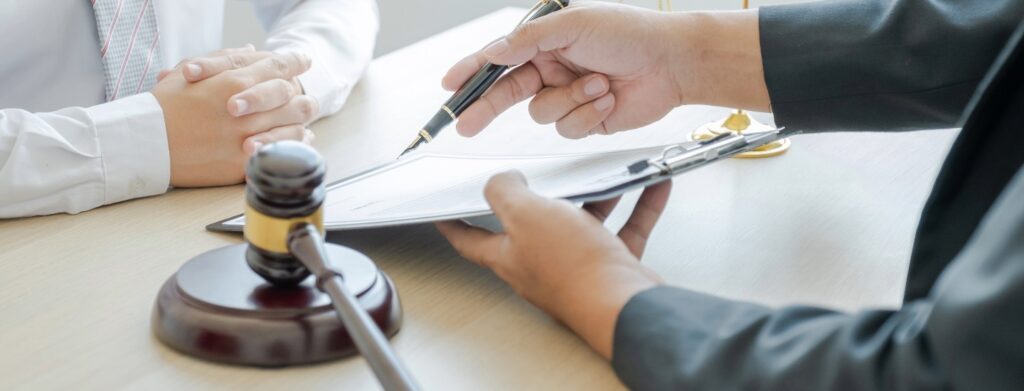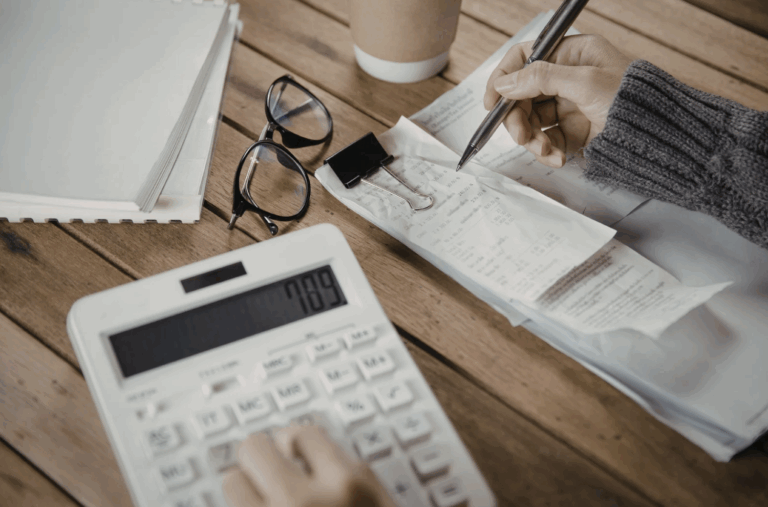If a creditor sues you, responding and paying attention to any important court dates is important. Failing to respond or missing your day in court could mean that you automatically lose the case. At that point, a default judgment is entered. So what happens after a default judgment is issued?
A default judgment is a court order saying you lost the lawsuit due to failing to respond. It validates the creditor’s debt, allowing them to collect the funds from you using the court order. The judgment creditor has the legal authority to collect that money in other ways. That may include wage garnishment, seizure of assets, frozen bank accounts, and more.
Needless to say, it’s not a good situation to be in. So, if you’re facing a debt lawsuit or already have a default judgment entered in favor of the creditor, here’s what happens after a default judgment is issued.
Process Leading to a Default Judgment
A default judgment occurs when you fail to respond to the lawsuit or show up for court. The court grants judgment in favor of the plaintiff (original creditor or debt collection agency that owns the debt) by default.
Here’s how it typically happens:
Filing of the Complaint
The plaintiff files a complaint or petition in a court, which outlines the claims against you related to monies owed.
Service of Process
You must be given proper notice of the lawsuit. This is done through “service of process,” where you’re served with a copy of the complaint and a court summons. The summons informs you of the lawsuit and notes the amount of time you have to respond and file your answer (usually, 20 to 30 days). It will also include your instructions, which may include a court date. However, many times the response date is actually for a written appearance and not one that is in person.
Failure to Respond
If you don’t file a response in time or don’t appear in court, you are in default.
Request for Default Judgment
The plaintiff creditor can then request the court to enter a default judgment. Depending on the jurisdiction, this may require a hearing, especially if the amount of damages isn’t specified or needs proof.
Entry of Default Judgment
If the judge determines the plaintiff is entitled to win, it will grant a default judgment in their favor. This is the final decision of a court that resolves the dispute and determines everyone’s rights and obligations. This judgment notes the amount of money you owe, which may include court costs, attorney’s fees, interest, and any other relief the plaintiff sought in the complaint.
Some contracts contain a provision known as a Confession of Judgment (COJ). These are common with merchant cash advances (MCAs), for example. A COJ allows the creditor to obtain a default judgment once you breach the terms of your contract without notifying you or giving you the chance to defend yourself in court.
What Happens After a Default Judgment Is Issued?
Once a default judgment is entered, the creditor has the legal right to enforce it. This means they can take steps to collect the amount awarded in the judgment if you don’t pay immediately. That might include:
- Garnishment: The creditor might obtain an order to garnish your wages. This means a portion of your earnings would be directly taken out of your paycheck and given to the creditor until the judgment amount is satisfied.
- Bank account levy: The creditor can also take money directly from your bank account to satisfy the debt. Your bank will freeze the account or the amount specified in the levy order. This prevents you from accessing the funds. Then the money is sent to the creditor.
- Property lien: The credit could also place a lien on your property, such as your house. A lien can prevent you from selling or refinancing the property without first paying off the judgment.
- Property seizure: In some jurisdictions, the creditor can request the sheriff or another officer of the court to seize your personal property to satisfy the judgment.
The Debtor’s Rights and Options Following a Default Judgment
Even after a default judgment is entered, debtors have certain rights. The specifics of these rights can vary by jurisdiction. But generally, the following rights and options are available to you if a default judgment is entered.
Motion to Set Aside or Vacate the Judgment in Court
You can ask the court to set aside or vacate the judgment if there is a basis to do so. Essentially, it’s a request to the court to undo the default judgment and allow the debt collection case to proceed as if the default never occurred. This provides the defendant an opportunity to defend themselves against the plaintiff’s claims.
To do this, the debtor generally needs to show a good reason, such as:
- Not receiving proper notice of the debt collection lawsuit
- Having a valid excuse for not responding in time
- Having a meritorious defense to the underlying claim (although you will need another basis to have the default lifted, like you didn’t receive notice of the lawsuit).
Exemptions
Most jurisdictions have laws that protect certain property from being taken to satisfy a judgment. This means that even if a creditor has a judgment, they can’t take or garnish certain assets. Common exemptions might include a certain amount of equity in a primary residence, necessary household goods, tools of a trade, and a certain amount of wages.
Appeal
While it’s less common to appeal a default judgment (since the debtor failed to appear or respond in the first place), it might be possible in some situations. For example, you may be able to file an appeal if the court lacked jurisdiction or if there was a clear error in entering the default judgment.
File for Bankruptcy
If you can’t pay the judgment and have other outstanding debts, filing for bankruptcy might be an option. A bankruptcy discharge can eliminate your obligation to pay many types of judgments. However, you do need to qualify for bankruptcy, and there are several types of bankruptcy as well; consulting with an attorney can help you determine if this is a good option.
Negotiate with the Creditor
Even after a default judgment, a debtor can attempt to negotiate with the creditor. They might be willing to accept a lesser amount (settle the debt) or agree to a payment plan, especially if they believe collecting on the full judgment will be difficult. Reach out to an experienced debt relief attorney to ensure that your rights are protected and the matter is properly resolved through debt settlement.
Credit Score Consequences for a Default Judgment
Judgments were previously included in credit reports, but this changed due to significant changes to credit reporting rules. In 2017, the three major credit bureaus (Experian, TransUnion, and Equifax) introduced changes in response to the National Consumer Assistance Plan, resulting from a settlement with 31 state attorneys general over alleged problems with credit report accuracy and resolution of consumer disputes.
One major change was removing nearly all civil judgments and tax liens from consumer credit reports. For a judgment or a tax lien to be included on a credit report, it must meet enhanced public record data standards, including:
- The public record must have the consumer’s name, address, and either the date of birth or Social Security number.
- All public record data must be checked for accuracy at least every 90 days.
Since many judgments and tax liens do not meet these criteria, the vast majority were removed from consumer credit reports.
This change aimed to improve the accuracy of credit reports and offer better consumer protection. However, even if a judgment does not appear on your credit report, it’s still legally valid, and creditors can still seek to collect the debt or enforce the judgment in other ways, such as garnishing wages or levying bank accounts.
Your Credit Could Still Be Negatively Impacted
Remember that if you were sued over a past-due debt, there were likely many missed payments and possible charge-offs leading up to the default judgment. These will have significantly damaged your credit score before a judgment was entered.
Poor credit can make it more difficult and expensive to borrow money, rent an apartment, open utility accounts, and more. That’s why if you’ve struggled with debt in the past and even faced a default judgment, it’s important to work toward recovering your finances. It often makes sense to work with a debt resolution professional, such as a debt relief attorney.
How to Recover From a Default Judgment
Recovering from a default judgment in a collection matter requires a combination of legal, financial, and personal actions. It’s important to address the immediate consequences of the judgment and rebuild your finances over time. Some steps to consider include:
- Get legal advice. Before taking any action, speaking with an experienced debt help attorney familiar with debt lawsuits and judgments is a good idea. They can provide advice tailored to your situation and guide you on the best course of action.
- Satisfy the judgment. If you can, pay the judgment amount. Once paid, ensure the creditor files a “satisfaction of judgment” with the court, indicating the debt has been settled. Be sure to get a copy for your records.
- Negotiate with the creditor. If vacating or paying the judgment in full isn’t possible, work with a debt settlement attorney to negotiate with the debt collector. Discuss potential payment plans, lump sum settlements, or other alternative arrangements. Sometimes, a creditor may accept a reduced amount to settle the debt quickly instead of going through the time and resources involved in pursuing wage garnishment, bank levies, etc.
- Work on repairing your credit. Your credit probably took a hit leading up to the default judgment, so it’s important to work toward rebuilding it. Start by obtaining copies of your credit reports from major credit bureaus. Verify the judgment’s listing and ensure it’s accurately reported. If there are errors on your credit report related to the judgment (or any other item), dispute them with the credit bureaus. Then begin rebuilding by paying all your bills on time, reducing debts, and using credit responsibly. Over time, positive credit behaviors can help offset the negative impact of the judgment.
Navigating Default Judgments
If a default judgment was filed against you, it’s important to have an experienced collection legal team on your side that understands the complexities of debt lawsuits and judgments.
Tayne Law Group has provided valuable legal help to individuals and business owners facing debt issues for over 20 years. If you’re struggling with any type of debt, reach out to our team for a free, no-obligation phone consultation. Call today for free at (866) 890-7337 or fill out our short contact form. We’ll respond as soon as possible. All conversations are confidential, and we never share or sell your information.





